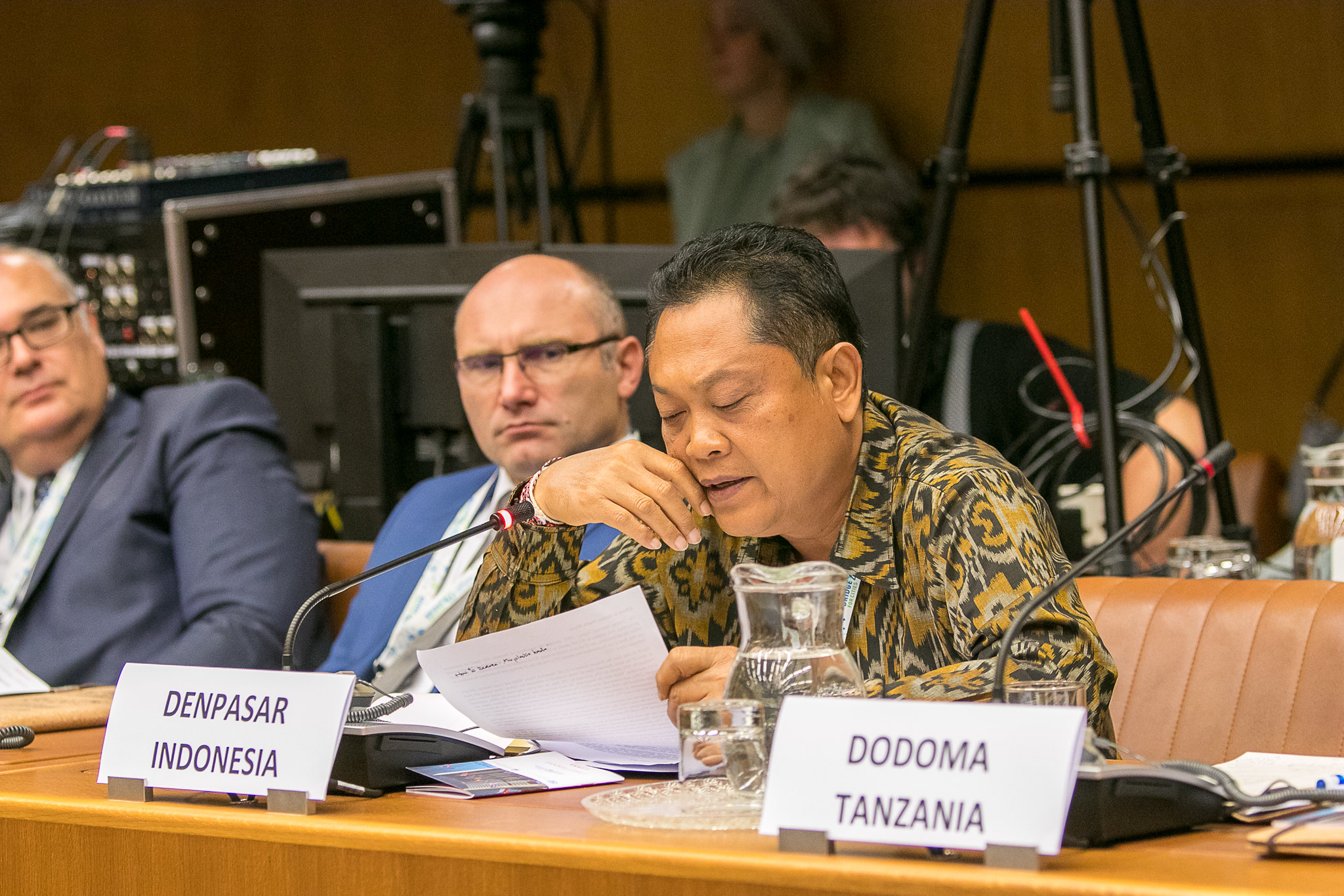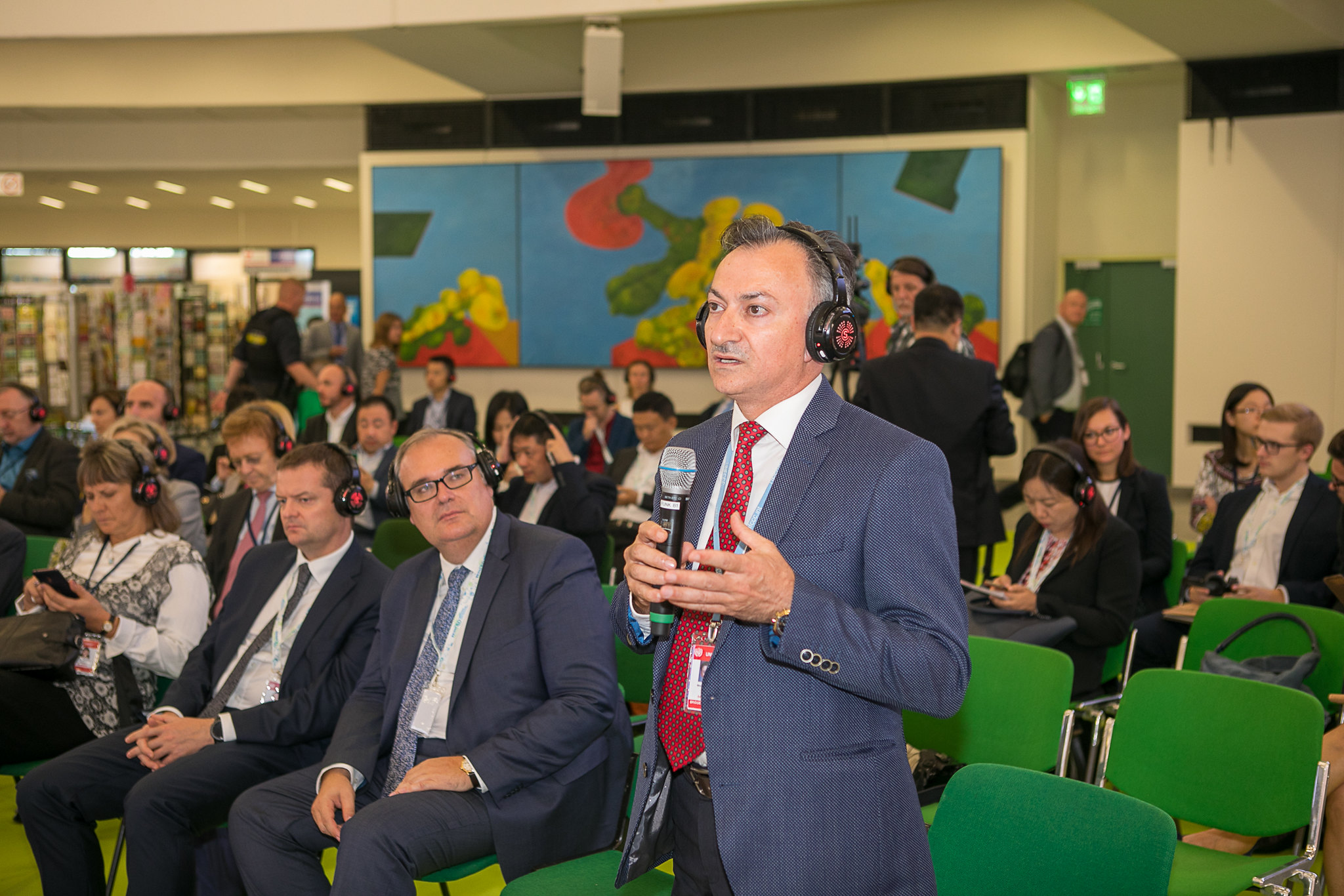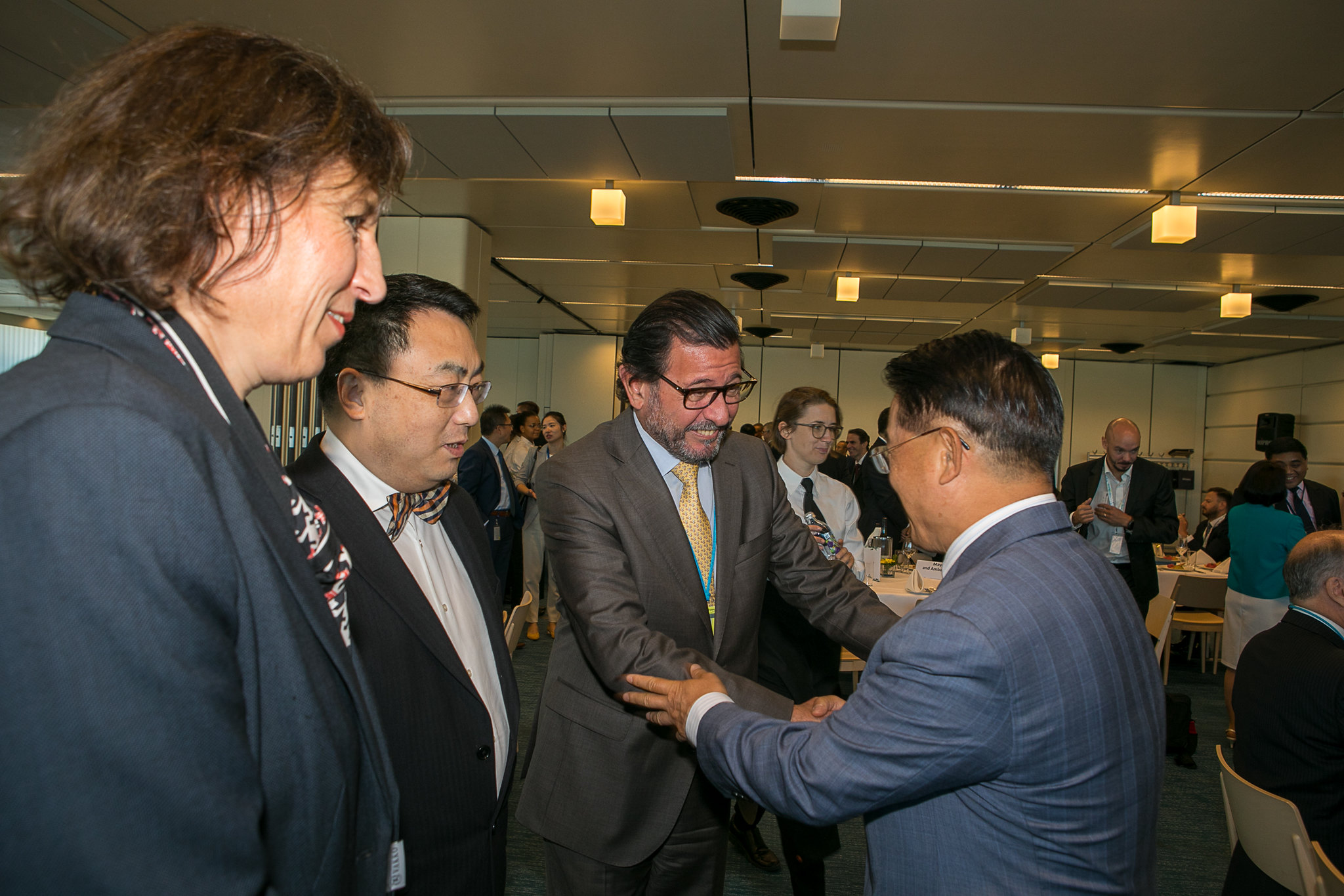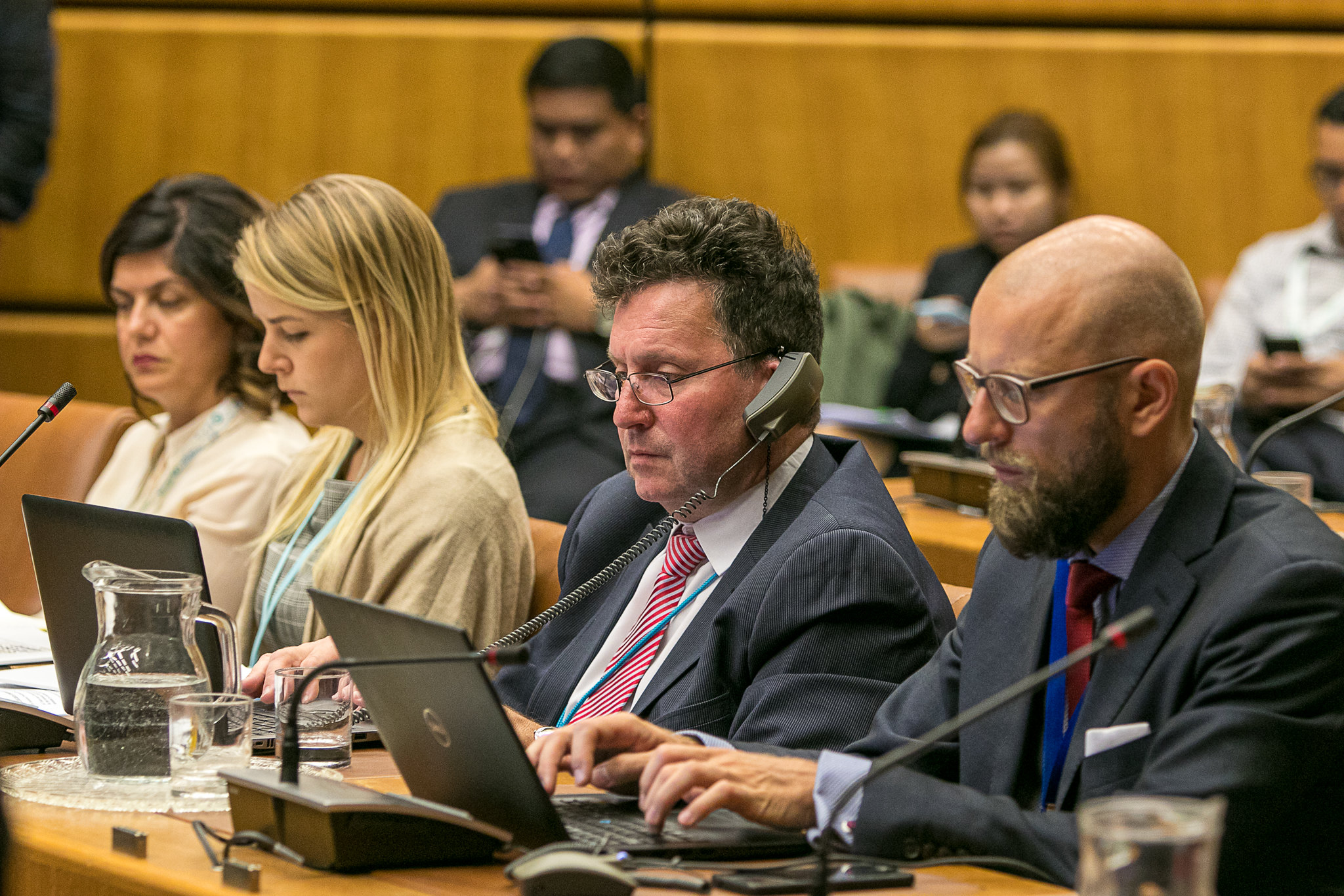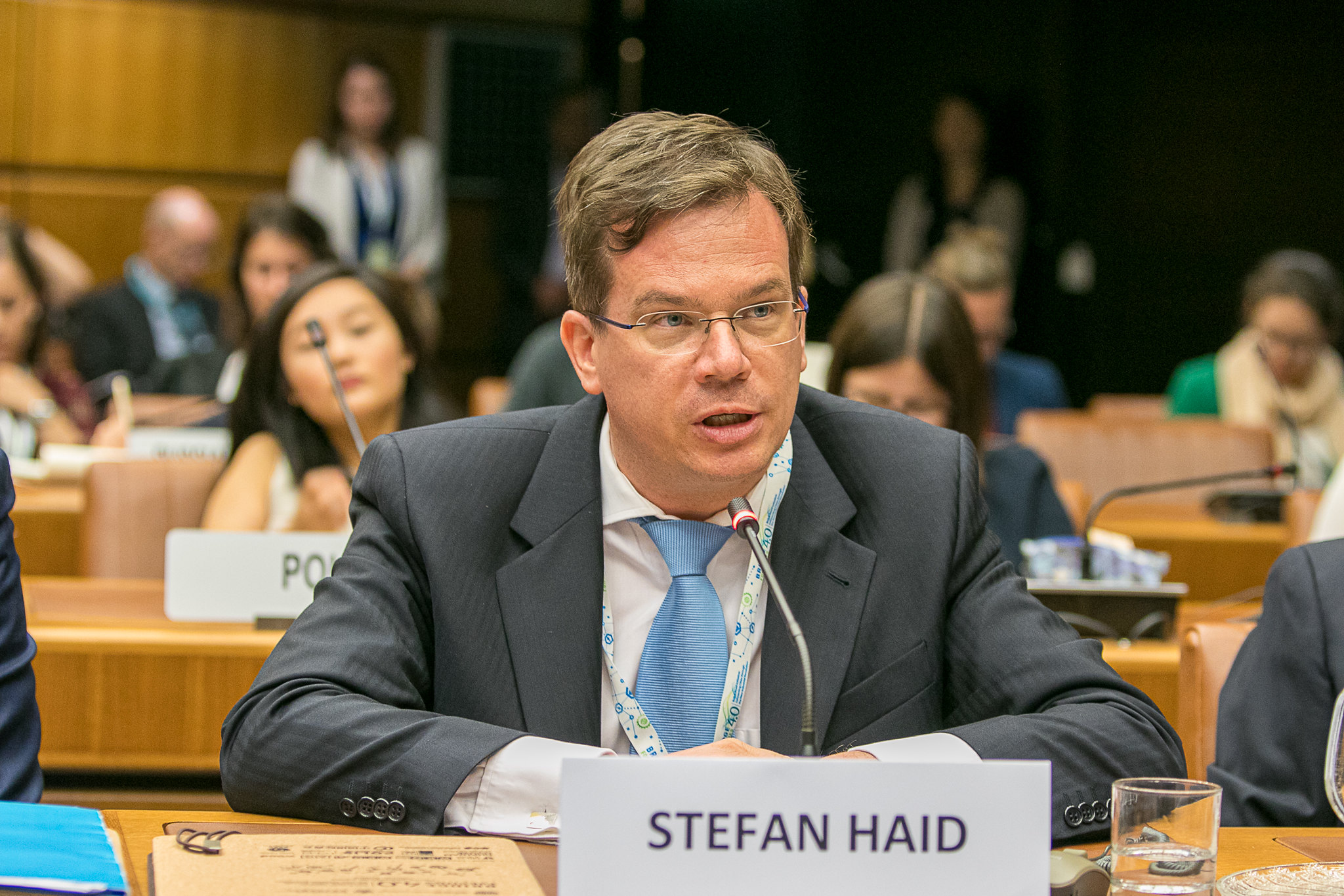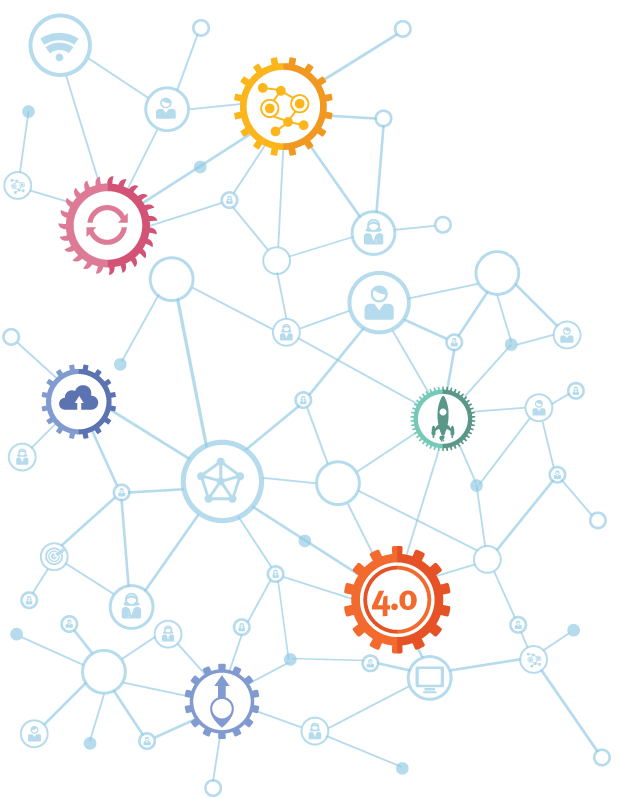
Background
Organized by the United Nations Industrial Development Organization (UNIDO), “BRIDGE for Cities – Belt and Road Initiative: Developing Green Economies for Cities” (“BRIDGE for Cities” event) is a large-scale annual event, which aims to advance the implementation of the Sustainable Development Goals (SDGs) and the New Urban Agenda. The event promotes the implementation of the 2030 Agenda for Sustainable Development via the Belt and Road Initiative (BRI), with which it shares many similarities, in all participating countries, to encourage municipal officials and development stakeholders to scale up their engagement in inclusive and sustainable urban-industrial development initiatives.
Based on the success of the previous events, BRIDGE for Cities 4.0 will explore the role of the Fourth Industrial Revolution in fostering urban innovation in cities along the Belt and Road and beyond. The “4.0” in the title symbolizes both the Fourth Industrial Revolution and the fourth edition of the event. It will aim at providing a wide and multidisciplinary perspective on how cities can tap into advanced technologies and new industrial solutions to enhance the quality of life for their citizens by reducing cities’ carbon footprint, improving public services as well as creating new jobs and attracting skilled labor.

Agenda
3 SEPTEMBER
Boardroom D, 4th Floor, Building C (9:30 – 10:45)
During the opening ceremony of BRIDGE for Cities 4.0, the speakers highlighted the various opportunities and possibilities presented by Industry 4.0 technology solutions, from artificial intelligence to green energy, while also emphasizing the importance of multilateral, multi-stakeholder partnerships for the achievement of inclusive and sustainable industrial development.
These sentiments were echoed in a written message from UN Secretary-General Mr. Antonio Guterres. To conclude the session, the humanoid Sophia Robot shared how artificial intelligence can be used to improve quality of life and interacted with Director General Mr. LI Yong.
Master of Ceremonies: Mr. Kai Bethke, Director, Department of External Relations, UNIDO
Statements by:
Mr. LI Yong, Director General, United Nations Industrial Development Organization
Ms. Galina Karelova, Deputy Chairperson of the Federation Council of the Federal Assembly of the Russian Federation
Mr. LIAN Weiliang, Vice-Chairman, National Development and Reform Commission, China
Mr. Abdulhamid Alkhalifa, Director General, OPEC Fund for International Development
Mr. CAI E-Sheng, Chairman, Finance Center for South-South Cooperation, Hong Kong, China
Mr. Mahmoud Mohieldin, Senior Vice President, World Bank Group
Ms. Anna Lisa Boni, Secretary General, EUROCITIES
Mr. Ernst Woller, First President of Provincial Parliament of Vienna, Austria
Boardroom D, 4th Floor, Building C (11:00 – 12:15)
Organized by UNIDO Department of Trade, Investment and Innovation and UNIDO Department of Policy Research and Statistics
The first plenary session of BRIDGE for Cities 4.0 discussed the role of high-tech parks and innovation hubs in powering the urban economy and assisting with the transition to smart cities. In this time of rapid technological progress and with the innovations of the 4th Industrial Revolution, technology parks and innovation hubs can attract investment, push for technological, social, and institutional change, and breed a culture of collaboration and partnership between various innovation stakeholders. The speakers in this session each touched on the different ways in which innovation hubs have been put to use in their cities and how they have transformed or improved aspects of daily life.
Moderator: Ms. Olga Memedovic, Chief and Deputy Director, Department of Trade, Investment and Innovation, UNIDO
Keynote Speaker: Mr. Frans-Anton Vermast, Strategy Advisor and International Smart City Ambassador, Amsterdam Smart City
Panellists:
Mr. Pirouz Hanachi, Mayor of Tehran, Iran
Mr. Ida Bagus Rai Dharmawijaya Mantra, Mayor of Denpasar, Indonesia
Mr. Adam Nagy, Deputy State Secretary for Industry Strategy of the Ministry of Innovation and Technology, Hungary
Mr. Andres Briceño, Director of Fab Lab Santiago, Chile
Mr. ZHOU Mingcheng, Vice-President for Global Public Affairs, Huawei
Mr. Phan Phalla, Under Secretary of State, Ministry of Economy and Finance and Secretary General, Economic and Financial Policy Committee, Cambodia
Rotunda, Ground Floor, Building C (12:30 – 12:45)
Cities’s leaders and UNIDO Director General inaugurated the exhibition booths in a short Ceremony.
On display for the entirety of the event, the Exhibition showcased booths from the four case cities and regions as well as 18 leading private sector companies. The case city booths provided a space for representatives to showcase innovative Industry 4.0 projects currently underway in their cities and regions. The private companies were selected from six countries and showcased their technological innovations in the areas of transport, energy, and communications.
Rotunda, Ground Floor, Building C (13:15 – 14:15)
Supported by ICLEI
With its strategic position on the New Belt and Road, the Upper Silesian region supported by GZM metropolis holds considerable collaboration potential for initiatives related to Industry 4.0 as well as digital and creative business sectors. Collaboration and integration between local and regional partners has clearly been a key attribute of their transition success thus far. Learning from and improving these partnerships will open new doors as the region’s transformation continues. Strategic initiatives however will need to not only provide economic opportunity but also support environmental action and increase inclusivity.
This CiBiX Exchange session explores how multi-level collaboration between public and private stakeholders is and continues be an essential aspect of the region’s transition towards sustainability. Diverse viewpoints from the different strategic partners will be shared focusing on their activities related to digitalization and industry 4.0. Speakers and participants are then invited to engage in dialogue-based networking on the key themes presented in the session.
Moderator: Ms. Rebecca Wessinghage, Officer, Transition Concepts, ICLEI-Local Government for Sustainability
Panellists:
Mr. Jacek Woźnikowski, Director, Department of Socio-Economic Development and Cooperation, Metropolis GZM
Ms. Aleksandra Zajusz-Wayda and Ms. Ewa Dudzic, Silesia Competence Centre of Industry 4.0
Mr. Mariusz Jankowski, Head of the Division for Investor’s Assistance, Katowice City Hall
Mr. Mateusz Rykała, Vice-President, Member of the Board Katowice Special Economic Zone
Mr. Jan Bondaruk, Deputy Director for Environmental Engineering, Central Mining Institute
Ms. Katarzyna Kobierska, Head of City Development Bureau, Gliwice Municipal Office
Rotunda, Ground Floor, Building C (12:45 – 13:15)
Cultural performances were organized during lunch break, to showcase different facets of cities’ cultural heritage.
Boardroom D, 4th Floor, Building C (14:30 – 15;45)
Organized by UNIDO Department of Environment
The second plenary session focused on how digitalization and Industry 4.0 solutions move cities towards a circular method of economy, ensuring a reduction in waste and resource consumption and an overall increase in efficiency. The increased connectedness of urban areas can greatly contribute to a decrease in negative environmental impacts, through the use of shared services, infrastructure, and resource supply and recycling. The panellists discussed different grass roots initiatives and innovation projects undertaken by cities and companies globally, and how the switch to a circular economic model will impact the future of cities and the well-being of citizens worldwide.
Moderator: Mr. Stephan Sicars, Director, Department of Environment, UNIDO
Keynote Speaker: Mr. Tomas Diez, Director of Fab Lab Barcelona
Panellists:
Mr. Klaus Heidinger, Global Head City IT Solutions – Siemens
Mr. Roger Kamgaing, Executive Vice President, SGS, Switzerland
Ms. Tri Rismaharini, Mayor of Surabaya, Indonesia
Ms. Birgit Ginzler, Senior Expert, Urban Innovation Vienna
Mr. Carlo Ratti, Director at MIT SENSEable City Lab
Boardroom D, 4th Floor, Building C (16:00 – 17:15)
Organized by UNIDO Department of Energy
Rapid urbanization and industrialization have corresponded to a dramatic increase in greenhouse gas (GHG) emissions and overall environmental degradation. The transportation sector is one of the largest contributors to urban GHG emissions and creates issues of air quality and environmental pollution. With this in mind, the third plenary session focused on the promotion and implementation of smart mobility solutions, including electric and new energy vehicles. In addition to showcasing existing projects, the speakers in this session also discussed challenges to the implementation of smart mobility and the infrastructure and policy ecosystems required for the widespread adoption of low carbon transportation solutions.
Moderator: Mr. Tareq Emtairah, Director, Department of Energy, UNIDO
Keynote Speaker: Mr. Dirk Fransaer, Managing Director, VITO – Flemish Institute for Technological Research
Panellists:
Mr. Kamel Ben Amara, Mayor of Bizerte, Tunisia
Mr. Gaye Seck, Mayor of Bargny, Senegal
Ms. Karen Vancluysen, Secretary General, POLIS
Mr. Filippo Berardi, Senior Climate Change Specialist, Global Environment Facility (GEF)
VIC Restaurant (From 18:00)
The first day of the event was closed by an informal gathering at the VIC restaurant.
* By invitation only
4 SEPTEMBER
Boardroom D, 4th Floor, Building C (09:00 – 11:00)
Co-organized with ICLEI
Automation and digitalization will have a deep impact on urban development, affecting the ways in which cities manage resources, provide citizen services, and develop spatially and economically. As the focus of BRIDGE for Cities 4.0 was on the impact of the Fourth Industrial Revolution at the urban level, this year’s event included a Mayors Roundtable, which brought together over 25 mayors to discuss lessons learnt and challenges experienced when implementing new technology solutions in their cities. The session was divided into four topics: climate action and sustainable infrastructure, resource management, the finance dilemma, and inclusiveness, with each mayor electing to speak on one topic of particular relevance to their experiences. The discussions resulted in a “Declaration of Intent”, adopted by 15 of the participating cities, which expressed their strong interest in working with UNIDO of future projects.
Moderator: Mr. Emani Kumar, Deputy Secretary General, ICLEI
Keynote Speaker: Mr. LI Yong, Director General, United Nations Industrial Development Organization
Participants:
Climate Change and Sustainable Infrastructure:
- Bizerte, Tunisia – Mr. Kamel Ben Amara, Mayor
- Addis Ababa, Ethiopia – Mr. Tesfaye Belijge Dara, Deputy Mayor; Head, Coordination Bureau of Democratic Institutions Building
- Podgorica, Montenegro – Ms. Slađana Vujačić, Deputy Mayor
- Katowice, Poland – Mr. Jerzy Wozniak, Deputy Mayor
Resource Management:
- Denpasar, Indonesia – Mr. Ida Bagus Rai Dharmawijaya Mantra, Mayor
- Dodoma, Tanzania – Mr. Davis Mwamfupe, Mayor
- Sihanoukville Province, Cambodia – Mr. Kong Vitanak, Vice Governor
- The Finance Dilemma:
- Phnom Penh, Cambodia – Mr. Nuon Pharat, Vice Governor
- Tirana, Albania – Mr. Erion Veliaj, Mayor
- Budapest, Hungary – Mr. Peter Szegvari, Senior Advisor of the Mayor
- Chengdu, China – Mr. ZHU Ping, Deputy Director of Chengdu Development and Reform Commission
- Inclusiveness:
- Zamboanga, Philippines – Ms. Maria Isabelle Climaco, Mayor
- Tehran, Iran – Mr. Pirouz Hanachi, Mayor
- Bargny, Senegal – Mr. Gaye Seck, Mayor
- Guangzhou, China – Mr. CHEN Zhiying, Executive Vice Mayor
- Nanchang, China – Mr. LONG Henan, Member of Nanchang Communist Party of China Committee and Head of Nanchang City Management
- Shenzhen, China – Mr. WU You, Deputy-Secretary General
- Montevideo, Uruguay – Mr. Carlos Leonczuk, Head of Inclusion city and Sustainability Council
- Attendees:
- Metropolis GZM, Poland – Mr. Grzegorz Kwitek, Member of the Board
- Conghua, China- Mr. CAI Shu, Mayor
- Beddawi, Lebanon – Mr. Hassan Ghamrawi, Mayor
- Zabrze, Poland – Mr. Krzysztof Lewandowski, Deputy Mayor
- Gliwice, Poland – Ms. Katarzyna Kobierska, Head of City Development Bureau
- Dortmund, Germany- Mr. Dirk von Bracht, Climate Energy Manager
- Essen, Germany– Sebastian Schlecht, Project Manager European Green Capital
- Zhuzhou, China– Ms. ZHONG Yan, Deputy Director, Zhuzhou Municipal People’s Congress Standing Committee
- Ufa, Russia – Mr. Ruslan Gaysin, Chief of IT Centre of Ufa Municipality
Conference room C4, 7th floor, Building C (11:15 – 12:30)
Co-organized with AIG and the Wood Group.
Another innovation of the fourth BRIDGE for Cities conference, the Business Roundtable brought together development stakeholders from the private sector to discuss their roles in development financing and the implementation of resilience principles in projects along the Belt and Road. Climate change poses a grave threat to many cities, but by embedding resilience and climate risk management into projects at the outset these cities can continue to develop unhindered by natural disasters and other climate effects. As leading private sector development stakeholders, panellists presented their approaches to financing, climate resilience and risk management, and the role of public-private partnerships along the Belt and Road. As a result of the discussion, the session developed a “Resilience Framework for Projects along the Belt and Road”.
Moderator: Mr. James Kynge, Global China Editor, Financial Times
Keynote Speaker: Mr. Ciyong ZOU, Director, Department of Programmes, Partnerships and Field Integration, UNIDO
Participants:
Mr. Alexander Biach, Deputy Director, Vienna Economic Chamber, Austria
Mr. Colin Wilson, Partner, Projects, Transport, Defence and Infrastructure at DLA Piper and member of DLA Piper International Board
Ms. Lin O’Grady, Deputy Head, Sustainable Infrastructure Group, European Bank for Reconstruction and Development (EBRD)
Mr. Michael Girioni, Vice President, Environment and Infrastructure Solutions, Wood PLC
Mr. Stefan Haid, Partner | Infrastructure, Competence Center Civil Economics, Energy & Infrastructure, Roland Berger
Mr. Marc Lehmann, Head, Catastrophe Management Solutions, American International Group
Ms. Zhang Jirong Joyce, Deputy Director General, Finance Center for South-South Cooperation
Mr. Wu Guangquan, President, Federation of Shenzhen Industries
Ms. Yu Jie, Senior Research Fellow on China, Chatham House
Mr. Peter Höfinger, Member of the Managing Board, Vienna Insurance Group
Mr. Xiaochen Zhang, President, FinTech4Good
Mr. WU Yue, National Production Safety Expert, China
Ms. Sharon Zhang Xiaowen, Director, Corporate Social Responsibility Research Center, China
C0739/41, 7th Floor, Building C (11:30 – 12:30)
As technology, innovation, and transport hubs for their respective countries, Shenzhen, China and the cities of Dortmund and Essen, Germany have many shared experiences and challenges. This workshop brought together representatives from the three cities in order to discuss the future of innovation and development in their cities, and the ways in which they can collaborate in areas of joint interest.
Moderator: Ms. Hannah Rothschild, City-Business Collaboration Officer, ICLEI – Local Governments for Sustainability
Participants:
Shenzhen:
Ms. YU Jing, Deputy Director General, Shenzhen Municipal Development and Reform Commission, China
Ms. GUO Yumei, Project Specialist of Shenzhen International Technology Promotion Center for Sustainable Development
Ms. LIN Shuyang, Senior Staff Member of Europe and Africa Division of Foreign Affairs Office, Shenzhen Municipal People’s Government
Ruhr Region:
Mr. Dirk von Bracht, Climate and Energy Manager, City of Dortmund, Germany
Mr. Sebastian Schlecht, Project Manager European Green Capital – Essen, City of Essen, Germany
VIC Restaurant (12:30 – 14:15)
The City Leaders and Ambassador Breakfast is an occasion for ambassadors, representatives from the permanent missions and from the participating cities to interact and share information about their projects and activities in an informal setting.
*By invitation only
Rotunda, Ground Floor, Building C (12:45 – 13:05)
Cultural performances will be organized during lunch break, to showcase different facets of cities’ cultural heritage.
Rotunda, Ground Floor, Building C (13:15 – 14:00)
Organized by Odyssey of the Dragon – Phoenix Television
Over the past seventy years the global economy has experienced massive growth, with industrialization and the development of cities and infrastructure following suit. Now, emerging economies are pushing developmental needs to new heights. How can we leverage globalization and connectivity and deploy advances in technology to address these issues? What are the practices, frameworks and relationships driving the sustainable cities of tomorrow?
In the recent past, Chinese companies and entrepreneurs have gained in-depth knowledge and experience in urbanization and industrialization, both at home and overseas, crafting strategies and activities unique to local markets and environments. In order to share this knowledge the Driving Innovation side event will gather these companies and individuals, present their case studies and establish a platform for further discussion and research.
Now more than ever, technology is transforming business and development. Breakthroughs in new energy, artificial intelligence and intelligent manufacturing are ushering in the rise of Industry 4.0, creating new needs and opportunities for development. Organized with support of the “Odyssey of the Dragon – Phoenix Television”, the Driving Innovation side event will address how multi-stakeholder partnerships, such as those fostered through South-South and triangular cooperation, can help develop training and capacity building, facilitate technology transfer and foster a culture of innovation.
In an effort to enliven the discussion and highlight media’s crucial role in spreading awareness regarding development issues, this side event will be held in a special “TV Talk Show” format.
Focus:
Partnerships for Innovation
- International Cooperation for Innovation – Explores the importance of international relationships and partnerships in fostering innovation and developing mechanisms for training, capacity building and technology transfer.
- South-South and Triangular Cooperation for Innovation – Multi-stakeholder relationships, as fostered through South-South and triangular cooperation, create additional opportunities for technology transfer and capacity building.
Fostering Innovation
- Leveraging Spaces for Innovation – With the explosion of technology parks and innovation hubs around the world, everyone, from governments and property developers to educational and development institutions, is seeking ways to spark and foster nodes of innovation. Which methods have proven most effective?
- Fostering a Culture of Innovation – What are the practices and cultures that have helped successfully grow cultures of innovation along the Belt and Road?
Moderator: Ms. Sharon Zhang Xiaowen, Phoenix Television Executive Producer
Welcome remarks: Ms. Olga Memodovic, Chief & Deputy Director, Department of Trade, Investment & Innovation, UNIDO
Panellists:
Sophia the Robot, Hanson Robotics
Mr. Xiaochen Zhang, President, FinTech4Good
Mr. Sebastian Schlecht, Project Manager European Green Capital – Essen, City of Essen, Germany
Mr. Brandon Zatt, Phoenix Television “Odyssey of the Dragon”
Closing Remarks: Ms. Zhou Meixiang, Deputy Director General, FCSSC
C0739/41, 7th Floor, Building C (13:30 – 14:30)
Supported by ICLEI
As part of an existing city-to-city cooperation agreement, Chengdu and Vienna have undertaken several collaborative projects in multiple sectors, ranging from technical and vocational education to transportation. This CiBiX Exchange session explores how this existing partnership can be both widened and deepened for the benefit of all involved stakeholders and for the push towards greater levels of sustainability.
This session will see a diverse panel of stakeholders share their experiences and ideas for further cooperation, which will help keep Chengdu a liveable and sustainable city and enable organizations and enterprises from the City of Vienna to share and expand their expertise.
Moderator: Ms. Hannah Rothschild, City-Business Collaboration Officer, ICLEI – Local Governments for Sustainability
Participants:
Chengdu:
Mr. Zhu Ping, Deputy Director of Chengdu Development and Reform Commission
Mr. Dong Yunfan, Deputy Director of General Office of Chengdu Municipal People’s Government
Mr. Wang Nan, Deputy Director of Policy Research Office of Chengdu Municipal Committee of the CPC
Mr. Sun Qinhuai, Deputy Director of Chengdu Municipal Ecological Environment Bureau
Mr. Huang Qiang, Division chief of Department of Economic System Reform of Chengdu Municipal Development and Reform Commission
Vienna:
Mr. Alexander Biach, Deputy Director, Vienna Economic Chamber
Ms. Ute Stadlbauer, International Business, Vienna Business Agency
Mr. Anton Aufner, Managing Director WIFI International, Austrian Economic Chamber
Mr. Christopher Müller, Executive Director, Rail Cargo Operator – Austria GmbH
Ms. Petra Distl, Consultant, Economic Policy/International Business, Vienna Economic Chamber
Ms. Claudia Kirchschlager, Consultant, Economic Policy/International Business, Vienna Economic Chamber
Boardroom D, 4th Floor, Building C (14:30 – 15:45)
Case region: Metropolis GZM (Silesian region), Poland; Sverdlovsk region, Russian federation; Ruhr region, Germany
The first case city session brought together the Metropolis GZM region, Poland, Ruhr region, Germany, and Sverdlovsk region, Russia on the basis of their common history of reliance on heavy industry in order to share their experiences with industrialization and urbanization and how Industry 4.0 solutions can be used to make the transition to a green economy smooth and advance the implementation of the 2030 Agenda. It was also a way to build and strengthen the partnership between the regions, and encourage knowledge sharing and future collaboration on shared challenges.
Moderator: Mr. Emani Kumar, Deputy Secretary General, ICLEI
Panellists:
Mr. Grzegorz Kwitek, Member of the Board, Metropolis GZM, Poland
Mr. Vasily Kozlov, Minister of International and Foreign Economic Relations of the Sverdlovsk Region, Russian Federation
Mr. Sergey Perestoronin, Minister of Industry and Science of the Sverdlovsk Region, Russian Federation
Mr. Dirk von Bracht, Climate and Energy Manager, City of Dortmund, Germany
Mr. Sebastian Schlecht, Project Manager European Green Capital – Essen, City of Essen, Germany
Ms. Irina Makieva, Deputy Chairman of VEB.RF; General Director of Monotowns Development Fund, Russian Federation
Mr. Mariusz Jankowski, Head of the Division for Investor’s Assistance, Katowice City Hall
Mr. Mateusz Rykała, Vice-President and Member of the Board, Katowice Special Economic Zone, Poland
Boardroom D, 4th Floor, Building C (16:00 – 17:15)
Case cities: Shenzhen, China – Phnom Penh, Cambodia
Matched on the basis of an existing sister-city partnership, the second case session brought together representatives from Phnom Penh, Cambodia, and Shenzhen, China. The panellists discussed the idea of “Smart Cities” and presented examples of smart city technology solutions implemented in their respective cities to address issues such as pollution and waste management, traffic congestion, and the streamlining of public services. This session was also used as a platform to discuss new, mutually beneficial areas of cooperation between the two cities and this commitment to collaboration was solidified with an exchange of letters between the city representatives.
Moderator: Ms. Zhang Jirong Joyce, Deputy Director General, Finance Center for South-South Cooperation
Keynote Speakers:
Mr. WU You, Deputy Secretary-General, Shenzhen Municipal Government, China
Mr. Nuon Pharat, Vice Governor of Phnom Penh, Cambodia
Panellists:
Ms. YU Jing, Deputy Director General, Shenzhen Municipal Development and Reform Commission, China
Ms. Khema Khon, Senior Official, Phnom Penh City Hall, Cambodia
Mr. HU Wei, Co-President & CTO, Ping An International Smart City Technology Co, Ltd, China
The Closing Ceremony – generously hosted by the City of Vienna – took place at the Rathaus and closed the event.
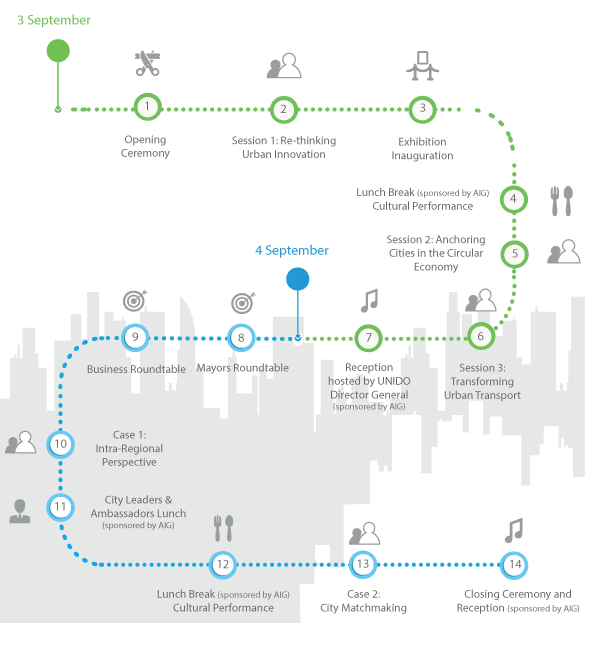
Event Outcomes
Declaration of Intent
As a concrete outcome of the Mayors Roundtable 15 participating cities – namely Addis Ababa; Bargny; Bizerte; Bontang; Budapest; Chefchaouen; Denpasar; Dodoma; Guangzhou; Montevideo; Phnom Penh; Podgorica; Sihanoukville; Tirana and Zamboanga – agreed to support a Declaration of Intent, which recognize the importance of Inclusive and Sustainable Industrial Development at the urban level and leaves the door open for exploring new ways of cooperation between these cities and UNIDO.
Issue Paper – Rethinking City-to-City Partnerships under the 4th Industrial Revolution
Lockdown and social distancing measures in the trail of the COVID-19 crisis have disrupted our normal ways of living, working, and communicating. Digitalization has proven to be instrumental to overcome some of these difficulties, helping local governments to respond to ever-changing exigencies in terms of governance, social services, commerce, work and health. Promoting behavioural shifts and applying technology-based smart city solutions to managing the effects of COVID-19 are of continued importance to urban economy, even beyond the crisis.
Resilience Framework for Projects along the Belt and Road
Organized jointly with AIG and Wood, the Business Roundtable organized during the event resulted in a agile framework which sets the basic steps necessary for the implementation of resilient project at urban level. This framework proposes a multitiered approach which has to be taken into consideration when designing and developing infrastructure project in cities and countries suffering from climate related stressors.
Photos
BRIDGE for Cities 2019 Highlights
Co-organizer

Partners
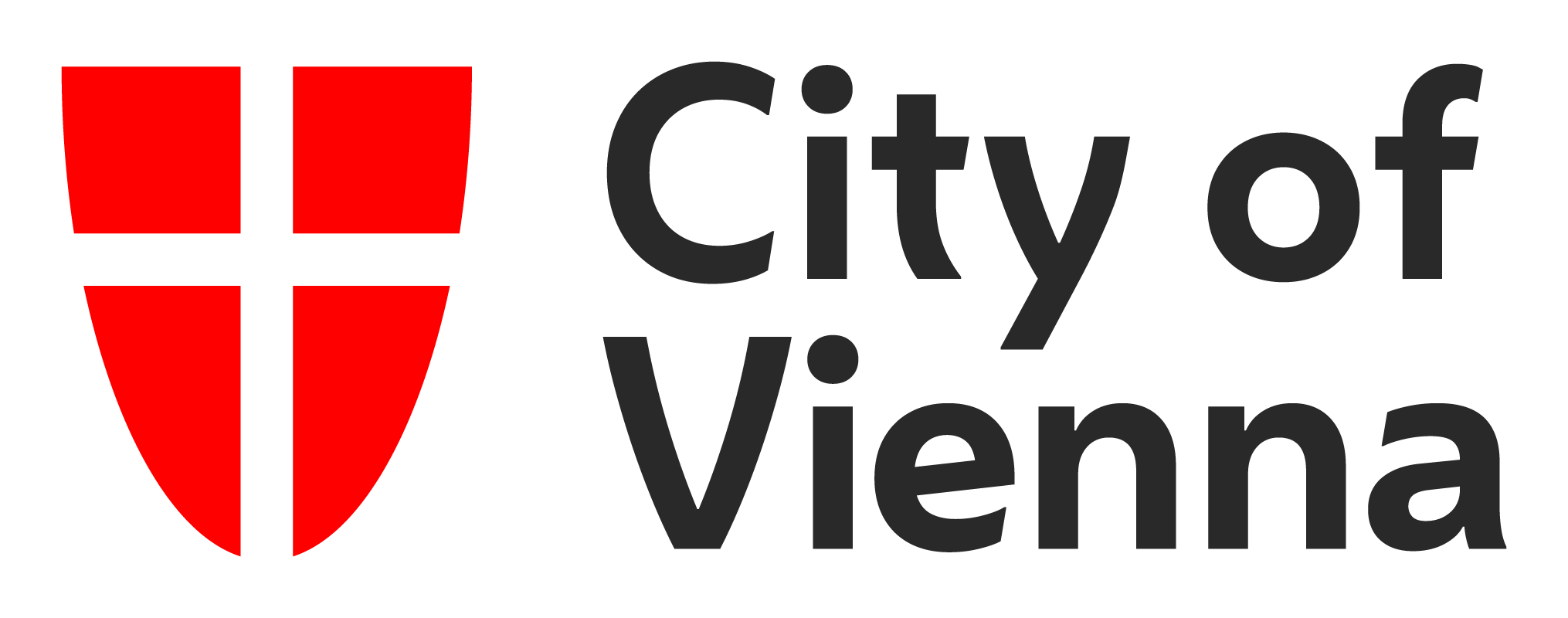
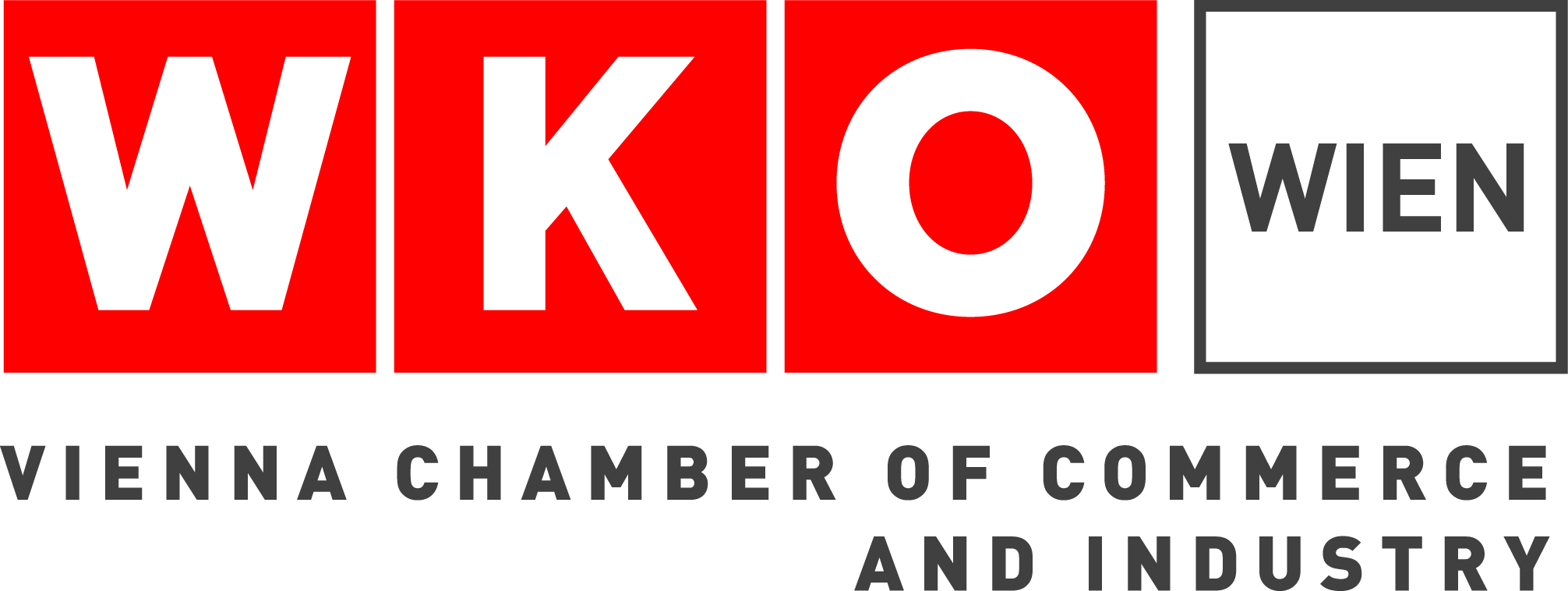


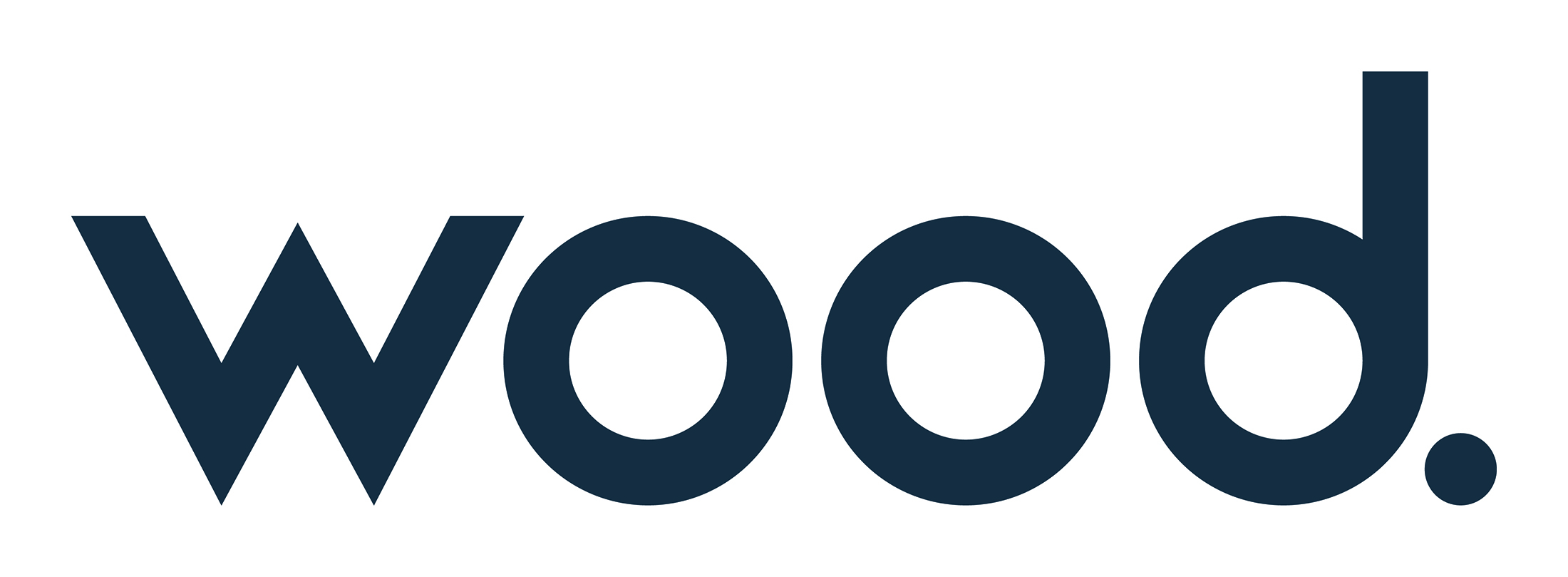

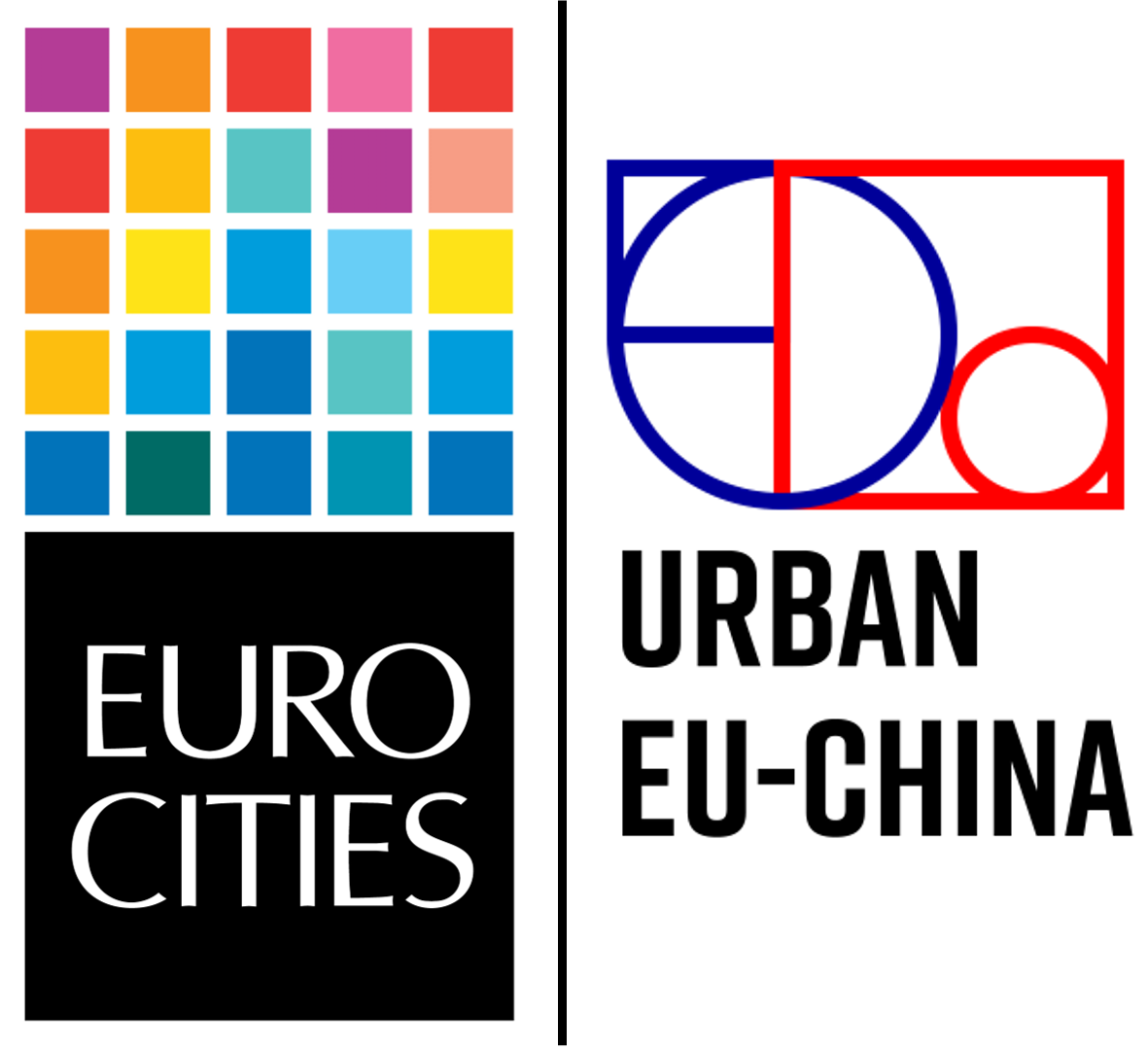
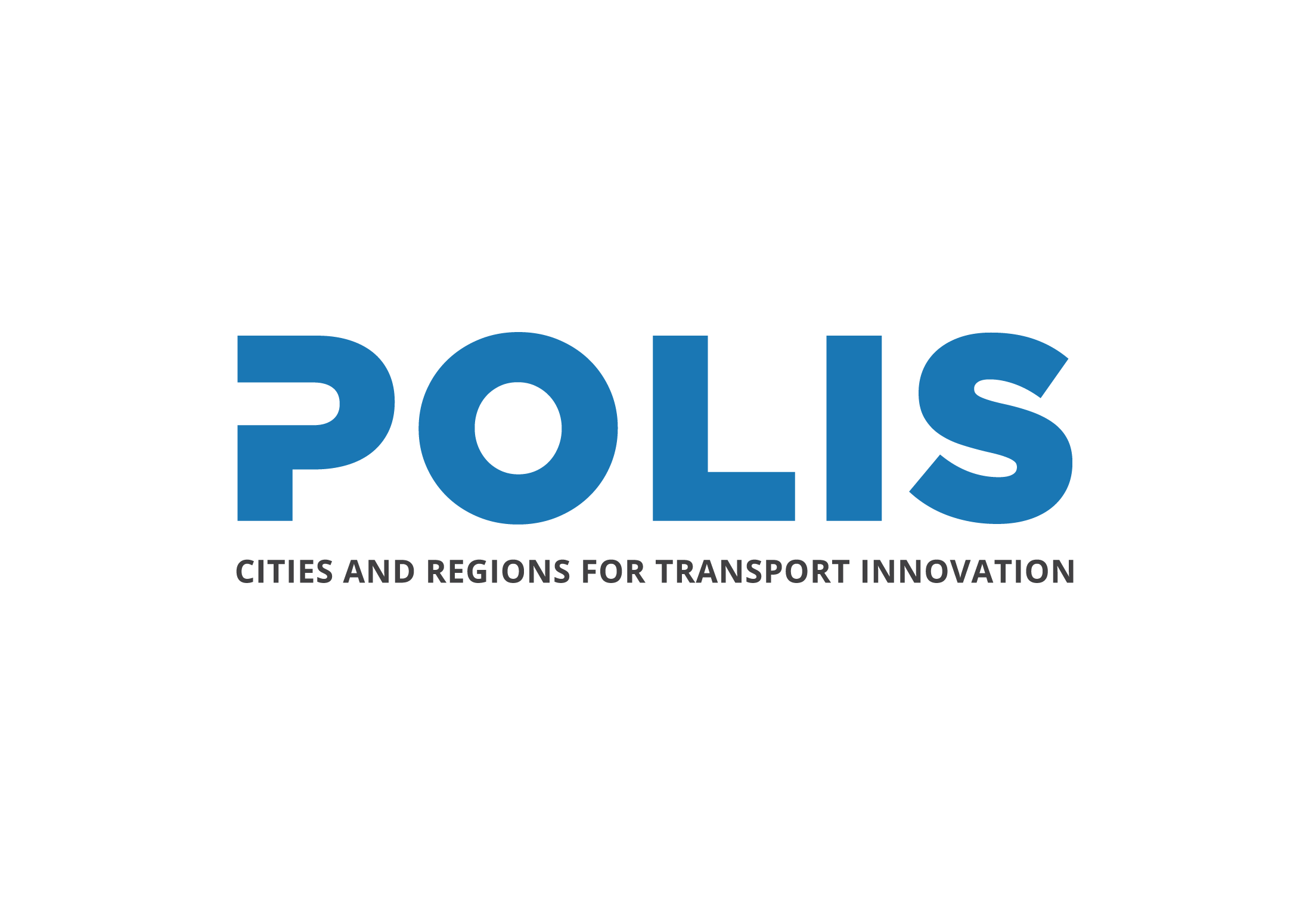
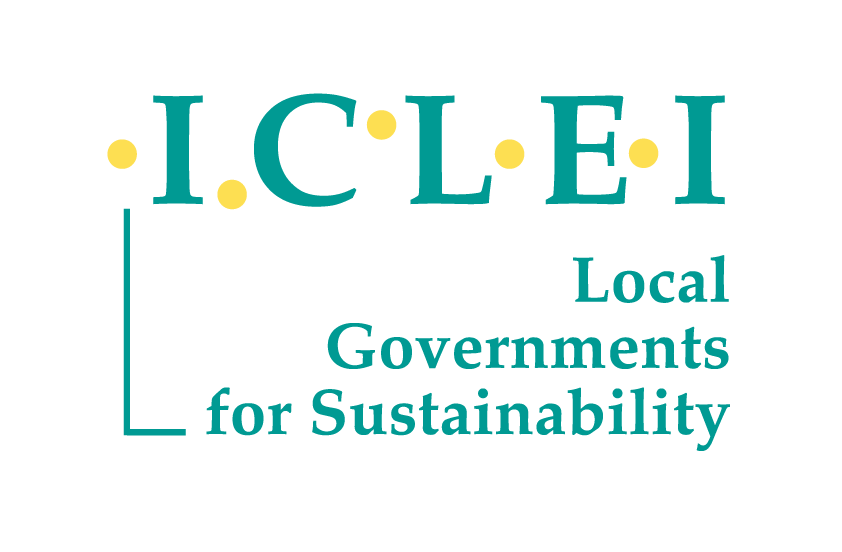
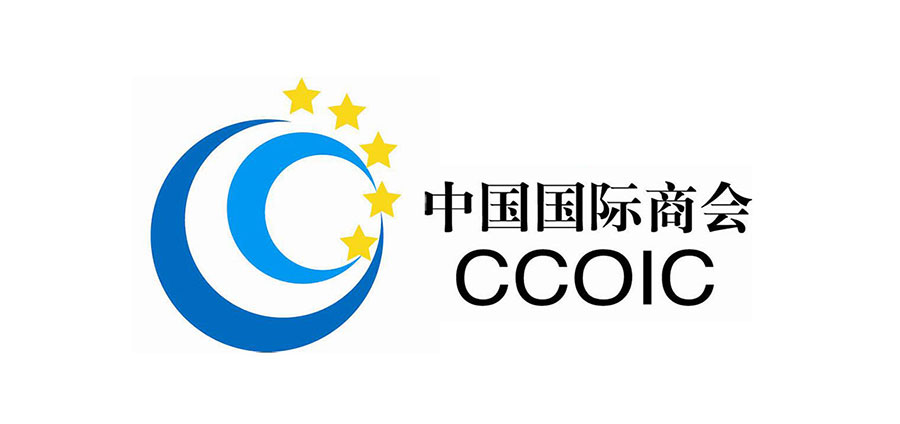

Media Partner:
Phoenix TV

Austrian Eco-label for Green Meetings / Green Events
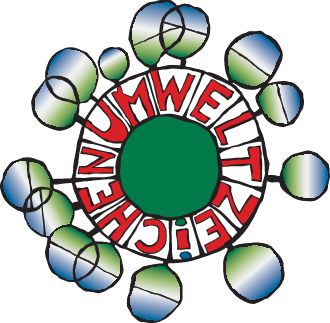
The event was awarded the Austrian Ecolabel for Green Meetings and Green Events, to save resources, avoid waste, and act in an environmentally conscious way in all fields.



